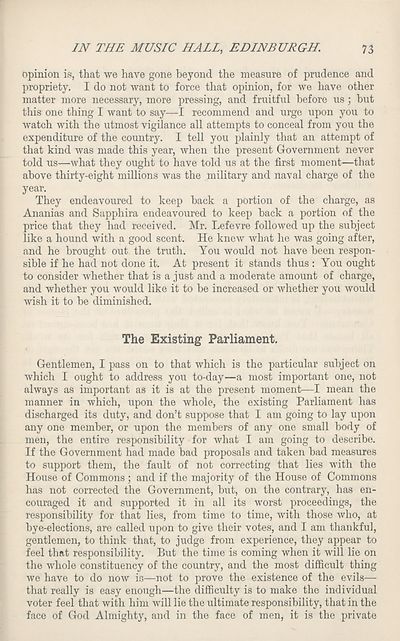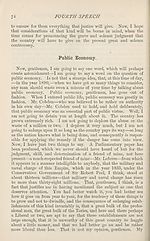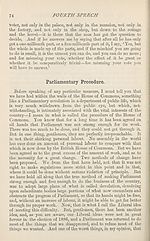Download files
Complete book:
Individual page:
Thumbnail gallery: Grid view | List view

IN THE MUSIC HALL, EDINBURGH
73
opinion is, that we have gone beyond the measure of prudence and
propriety. I do not want to force that opinion, for we have other
matter more necessary, more pressing, and fruitful before us; hut
this one thing I want to say—I recommend and urge upon you to
watch with the utmost vigilance all attempts to conceal from you the
expenditure of the country. I tell you plainly that an attempt of
that kind was made this year, when the present Government never
told us—what they ought to have told us at the first moment—that
above thirty-eight millions was the military and naval charge of the
year.
They endeavoured to keep back a portion of the charge, as
Ananias and Sapphira endeavoured to keep back a portion of the
price that they had received. Mr. Lefevre followed up the subject
like a hound with a good scent. He knew what he was going after,
and he brought out the truth. You would not have been respon¬
sible if he had not done it. At present it stands thus : You ought
to consider whether that is a just and a moderate amount of charge,
and whether you would like it to be increased or whether you would
wish it to be diminished.
The Existing Parliament.
Gentlemen, I pass on to that which is the particular subject on
which I ought to address you to-day—a most important one, not
always as important as it is at the present moment—I mean the
manner in which, upon the whole, the existing Parliament has
discharged its duty, and don’t suppose that I am going to lay upon
any one member, or upon the members of any one small body of
men, the entire responsibility for what I am going to describe.
If the Government had made bad proposals and taken bad measures
to support them, the fault of not correcting that lies with the
House of Commons; and if the majority of the House of Commons
has not corrected the Government, but, on the contrary, has en¬
couraged it and supported it in all its worst proceedings, the
responsibility for that lies, from time to time, with those who, at
bye-elections, are called upon to give their votes, and I am thankful,
gentlemen, to think that, to judge from experience, they appear to
feel that responsibility. But the time is coming when it will lie on
the whole constituency of the country, and the most difficult thing
we have to do now is—not to prove the existence of the evils—
that really is easy enough—the difficulty is to make the individual
voter feel that with him will lie the ultimate responsibility, that in the
face of God Almighty, and in the face of men, it is the private
73
opinion is, that we have gone beyond the measure of prudence and
propriety. I do not want to force that opinion, for we have other
matter more necessary, more pressing, and fruitful before us; hut
this one thing I want to say—I recommend and urge upon you to
watch with the utmost vigilance all attempts to conceal from you the
expenditure of the country. I tell you plainly that an attempt of
that kind was made this year, when the present Government never
told us—what they ought to have told us at the first moment—that
above thirty-eight millions was the military and naval charge of the
year.
They endeavoured to keep back a portion of the charge, as
Ananias and Sapphira endeavoured to keep back a portion of the
price that they had received. Mr. Lefevre followed up the subject
like a hound with a good scent. He knew what he was going after,
and he brought out the truth. You would not have been respon¬
sible if he had not done it. At present it stands thus : You ought
to consider whether that is a just and a moderate amount of charge,
and whether you would like it to be increased or whether you would
wish it to be diminished.
The Existing Parliament.
Gentlemen, I pass on to that which is the particular subject on
which I ought to address you to-day—a most important one, not
always as important as it is at the present moment—I mean the
manner in which, upon the whole, the existing Parliament has
discharged its duty, and don’t suppose that I am going to lay upon
any one member, or upon the members of any one small body of
men, the entire responsibility for what I am going to describe.
If the Government had made bad proposals and taken bad measures
to support them, the fault of not correcting that lies with the
House of Commons; and if the majority of the House of Commons
has not corrected the Government, but, on the contrary, has en¬
couraged it and supported it in all its worst proceedings, the
responsibility for that lies, from time to time, with those who, at
bye-elections, are called upon to give their votes, and I am thankful,
gentlemen, to think that, to judge from experience, they appear to
feel that responsibility. But the time is coming when it will lie on
the whole constituency of the country, and the most difficult thing
we have to do now is—not to prove the existence of the evils—
that really is easy enough—the difficulty is to make the individual
voter feel that with him will lie the ultimate responsibility, that in the
face of God Almighty, and in the face of men, it is the private
Set display mode to:
![]() Universal Viewer |
Universal Viewer | ![]() Mirador |
Large image | Transcription
Mirador |
Large image | Transcription
| Antiquarian books of Scotland > Politics & government > Political speeches in Scotland in 1890 > (77) |
|---|
| Permanent URL | https://digital.nls.uk/126569214 |
|---|
| Description | Thousands of printed books from the Antiquarian Books of Scotland collection which dates from 1641 to the 1980s. The collection consists of 14,800 books which were published in Scotland or have a Scottish connection, e.g. through the author, printer or owner. Subjects covered include sport, education, diseases, adventure, occupations, Jacobites, politics and religion. Among the 29 languages represented are English, Gaelic, Italian, French, Russian and Swedish. |
|---|

